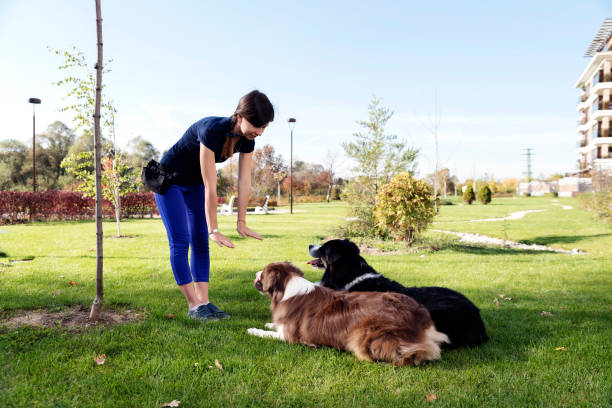How to Train an Adult Dog: Obedience, Socialization & Behavior Tips for Older Dogs

There’s a common myth that says, “You can’t teach an old dog new tricks.” But in the world of professional dog training, we know that couldn’t be further from the truth.
Adult dog training is not only possible—it’s often more effective than training a young puppy. Older dogs tend to have better focus, less energy-driven distraction, and a greater desire to bond with their humans. Whether you’ve adopted a rescue, skipped training in the puppy years, or need to address behavior issues later in life, the right approach can make all the difference.
In this guide, we’ll explore the benefits of adult dog training programs, how to get started, and the best ways to improve obedience, behavior, and socialization at any age.
Why Adult Dogs Need Training Too
Many owners assume that if a dog didn’t learn manners as a puppy, it’s too late. But the truth is, training adult dogs is not only achievable—it’s essential for a safe, calm, and happy home.
Whether your dog is 2 or 12, adult training can help with:
Pulling on the leash
Ignoring commands
Jumping on guests
Barking or reactivity
Anxiety or fear-based behaviors
Aggression toward other dogs
Difficulty in new environments
If you’re searching for help with dog training for older dogs, now is the perfect time to explore a structured solution.
How to Train an Adult Dog: Step-by-Step
Training an adult dog requires patience, consistency, and the right balance of structure and motivation. Unlike puppies, adult dogs may come with habits—good or bad—that must be acknowledged before new behaviors can stick.
1. Assess Behavior & Start with the Basics
Even if your dog knows “sit” or “stay,” start fresh. Many older dogs need a reset before building on obedience. Look for professional guidance from a certified dog specialist or enroll in an adult dog training program that begins with a behavioral evaluation.
2. Use Positive Reinforcement
Older dogs respond well to rewards-based training. Treats, toys, praise, or playtime are great motivators. Avoid harsh correction—especially for rescue dogs or those with a traumatic past.
3. Be Consistent Across the Household
If your dog is allowed on the couch by one person but scolded by another, progress stalls. Create a consistent structure everyone follows. A local adult dog training class can help align all household members.
4. Practice in Real Environments
Proofing behavior in public settings helps adult dogs generalize commands. Practice walking calmly around distractions, responding to commands at the park, or ignoring doorbells.
Benefits of Adult Dog Training Classes
Adult dog training classes are designed for mature dogs who need to build or relearn obedience skills. These group classes also help dogs gain confidence and reduce reactivity.
If your dog is friendly but unfocused in public, adult dog socialization classes can provide:
Controlled exposure to other dogs
Practice obeying commands around distractions
Redirection away from unwanted behaviors
Confidence building for shy or fearful dogs
Professional adult dog training programs go beyond group classes by offering customized plans for reactivity, anxiety, and other behavior issues.
Obedience and Behavior Modification for Older Dogs
For dogs showing serious behavioral challenges—like aggression, fear, or anxiety—basic obedience isn’t enough. They may need behavior-focused training tailored to their emotional state.
Behavior modification for adult dogs focuses on:
Identifying specific triggers (people, other dogs, sounds)
Using desensitization and counter-conditioning techniques
Teaching new coping strategies and emotional regulation
Rebuilding trust in the environment and the handler
Working with a dog behavior modification trainer ensures your dog’s emotional health is prioritized during training, especially for rescues or adult dogs with unknown backgrounds.
Choosing the Right Adult Dog Training Program
Not all training programs are created equal. A strong adult dog training program will include:
A professional behavioral assessment
Customized training goals
Obedience foundation and impulse control
In-home practice plans or in-facility sessions
Real-world application (public space training)
Ongoing support and handler coaching
Whether you’re looking for training for adult dogs or advanced obedience for adult trained dogs, make sure the program you choose is focused on results—not just attendance.
If you’re in South Florida, K-9 Specialist offers hands-on, real-behavior adult dog training in Miami, Broward County, and beyond—with options tailored to older dogs, rescues, and behavioral needs.
Frequently Asked Questions
Can adult dogs still be trained effectively?
Yes. Adult dogs are often easier to train than puppies because they have better attention spans and stronger desire to bond with their owners.
What’s the best training method for older dogs?
Positive reinforcement with clear structure works best. Older dogs often respond well to calm leadership, consistent rules, and rewards-based learning.
Are group classes or private sessions better for adult dogs?
It depends. Social adult dogs may do well in group classes. Anxious or reactive dogs benefit more from private behavior-focused sessions.
Is training safe for senior or aging dogs?
Yes—with some adjustments. For senior dogs, physical limitations are considered, and training focuses more on mental enrichment and calm behavior.
Final Thoughts: Adult Dogs Deserve a Second Chance
Whether your adult dog is unruly, reactive, or simply untrained—it’s never too late to make a change. With the right guidance, structure, and consistency, your dog can develop calm, confident behavior that lasts a lifetime.
Training adult dogs is about more than just commands—it’s about rebuilding trust, improving communication, and creating a safer, more enjoyable life for both of you.
If you’re ready to give your dog a fresh start, explore a professional adult dog training program and take the first step toward long-term transformation.
